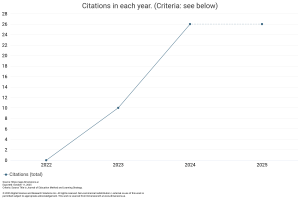Analysis of The Correlation Between Gratitude and Emotional Intelligence Among University Students
DOI:
https://doi.org/10.59653/jemls.v1i03.223Keywords:
Gratitude, Emotional Intelligence, StudentsAbstract
People with a high level of emotional intelligence can keep their feelings under control, both towards other people and towards themselves. As a result, it has been discovered that practicing gratitude can help students improve their emotional intelligence. This research aimed to investigate the connection between being grateful and having high levels of emotional intelligence among students. The investigation utilized a quantitative method and a design based on correlation. This research was carried out with the participation of 91 total students. Two scales were used in the data collection: a 15-item Emotional Intelligence Scale and the Development and Validation of the Islamic Gratitude Scale (IGS-10), created by Ahmad Rusdi in 2021 to measure thankfulness. The analysis of the data showed that gratitude and emotional quotient are positively correlated with one another. This suggests that greater levels of gratitude are connected with greater levels of emotional intelligence; hence, this demonstrates that gratitude can increase students' emotional intelligence and should be emphasized in educational settings.
Downloads
References
Andeslan, S., & Uyun, Q. (2023). Hubungan Antara Rasa Syukur Terhadap Tingkat Depresi, Cemas, Stres Pada Mahasiswa Tingkat Akhir di Masa Peralihan Pandemi Covid-19. Cakrawala Repositori IMWI, 6(1), 681–690. https://doi.org/10.52851/cakrawala.v6i1.259
Batool, H., Batool, I., & Quraishi, I. S. (2022). Gratitude Mediates the Effects of Emotional Intelligence on Happiness Among Medical Students: a Structural Equation Modeling Analysis. Pakistan Journal of Social Research, 04(04), 313–320. https://doi.org/10.52567/pjsr.v4i04.814
Dewi, A., & Munirah, M. (2022). Konsep Syukur dalam Al- Qur ’ an ( Studi QS . Ibrahim [ 14 ]: 7 dengan Pendekatan Ma ’ na Cum Maghza ). Syams : Jurnal Studi Keislaman, 3(2), 182–197.
Difa, M., & F, S. (2016). Pengaruh kecerdasan emosi dan dukungan sosial terhadap resiliensi mahasiswa perantau uin syarif hidayatullah jakarta. TAZKIYA: Journal of Psychology, 4(2), 77–97. https://doi.org/10.15408/tazkiya.v4i2.10840
Emmons, R. A., & McCullough, M. E. (2003). Counting blessings versus burdens: An experimental investigation of gratitude and subjective well-being in daily life. Journal of Personality and Social Psychology, 84(2), 377–389. https://doi.org/10.1037/0022-3514.84.2.377
Fatmala, D., & Sari, C. A. K. (2022). Pengaruh Rasa Syukur terhadap Kesejahteraan Psikologis pada Mahasiswa S1 UIN Tulung Agung di Masa Pandemi Covid-19. Journal of Islamic and Contemporary Psychology (JICOP), 2(1), 15–25. https://doi.org/10.25299/jicop.v2i1.9009
Fauz, M. M. (2017). KECERDASAN EMOSIONAL MENURUT LUQMAN AL-HAKIM (STUDI ANALISIS SURAT LUQMAN, AYAT 12 – 19). Jurnal Pendidikan Islam Al I’tibar, 4(1), 50–71.
Karimulloh, G., N., & Caninsti, R. (2021). Tiga Tema Konsep Kebersyukuran dalam Perspektif Al-Qur’an. Sebuah Literatur Review. Jurnal Online Studi Al-Qur An, 17(02), 251–263. https://doi.org/10.21009/jsq.017.2.05
Kistianingsih, K. A., & Purwandari, E. (2020). Rasa Syukur, Dukungan Sosial, Dan Kesejahteraan Psikologis Purna Jabatan Pegawai Negeri Sipil. Jurnal Psikohumanika, 12(2), 133–151. https://doi.org/10.31001/j.psi.v12i2.895
Lestari, Y. I. (2021). Kebersyukuran Remaja Muslim Meningkatkan Kepuasan Hidup dan Suasana Hati Positif sebagai Cerminan Subjective Well Being. Jurnal Psikologi, 17(1), 31–46. https://doi.org/10.24014/jp.v17i1.10944
Nindyati, A. D. (2020). KECERDASAN EMOSI DAN STRES AKADEMIK MAHASISWA: PERAN JENIS KELAMIN SEBAGAI MODERATOR DALAM SEBUAH STUDI EMPIRIK DI UNIVERSITAS PARAMADINA. Journal of Psychological Science and Profession, 4(2), 127–134. https://doi.org/10.24198/jpsp.v4i2.25505
Prabowo, R., & Laksmiwati, H. (2020). Hubungan antara Rasa Syukur dengan Kebahagiaan pada Mahasiswa Jurusan Psikologi Universitas Negeri Surabaya. Chracter, Jurnal Penelitian Psikologi, 7(1), 1–7.
Putri, D. R., & Rachmawati, A. (2022). Peran Rasa Syukur dalam Meningkatkan Kualitas Hidup. Senriabdi, 2(Desember), 237–241.
Rusdi, A., Sakinah, S., Bachry, P. N., Anindhita, N., & Hasibuan, M. A. I. (2021). The development and validation of the islamic gratitude scale (IGS-10) (Vol. 7, Issue 2, pp. 120–142). https://doi.org/10.19109/psikis.v7i2.7872
Szcześniak, M., Rodzeń, W., Malinowska, A., & Kroplewski, Z. (2020). Big five personality traits and gratitude: The role of emotional intelligence. Psychology Research and Behavior Management, 13(November), 977–988. https://doi.org/10.2147/PRBM.S268643
Takdir, M. (2017). Kekuatan Terapi Syukur dalam Membentuk Pribadi yang Altruis: Perspektif Psikologi Qur’ani dan Psikologi Positif. Jurnal Studia Insania, 5(2), 175. https://doi.org/10.18592/jsi.v5i2.1493
Downloads
Published
How to Cite
Issue
Section
License
Copyright (c) 2023 Adang Darmawan Achmad, Hudzaifah Achmad Qotadah, Hanna Safira El Qubro

This work is licensed under a Creative Commons Attribution-ShareAlike 4.0 International License.
Authors who publish with this journal agree to the following terms:
- Authors retain copyright and grant the journal right of first publication with the work simultaneously licensed under a Creative Commons Attribution-ShareAlike that allows others to share the work with an acknowledgement of the work's authorship and initial publication in this journal.
- Authors are able to enter into separate, additional contractual arrangements for the non-exclusive distribution of the journal's published version of the work (e.g., post it to an institutional repository or publish it in a book), with an acknowledgement of its initial publication in this journal.
- Authors are permitted and encouraged to post their work online (e.g., in institutional repositories or on their website) prior to and during the submission process, as it can lead to productive exchanges, as well as earlier and greater citation of published work (See The Effect of Open Access).
























